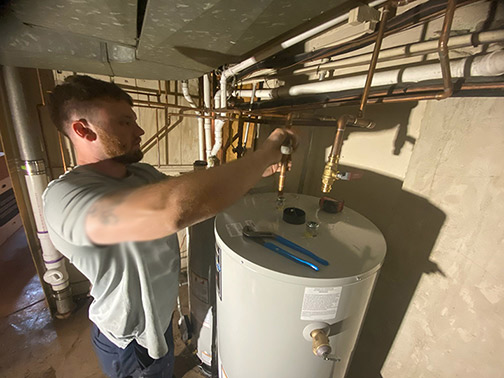
With an aging water heater in your home, you not only run out of hot water sooner than you expect, but your energy bills will be way higher than they should. That’s because as a water heater ages, it loses efficiency and needs ever more energy to do the same work as before.
Additionally, Keyrenter Miami West notes that traditional water heaters need to keep a full tank of water heated 24/7. Because the heated water in the tank constantly loses heat via standby heat loss, the unit repeatedly heats and reheats the same water all day long, leading to a lot of wasted energy.
But these are not the only issues with the old water heater. The risk of water damage to your house due to water heater leaks is also significant. Moreover, a corroded water heater tank can contaminate your hot water supply by coloring and leaching toxic metals into it.
All these problems can be solved by replacing your current water heater to a more energy-efficient model. What are your best options when upgrading your water heater to save energy? How will making this upgrade impact your home, energy-wise and otherwise?
Best water heater options for saving energy
The best water heater models for saving energy are:
Heat pump water heaters (hybrid water heater)
At the top of our list are heat water pumps, which, instead of using electricity to generate heat directly, use electricity to move heat from the air or ground to heat water. Heat water pumps work like a refrigerator in reverse, making them up to 3 times more efficient than traditional water heaters. The efficiency of a unit depends on its specifics, though.
Heat pumps can be standalone units with built-in water storage, or they can be retrofitted to work with an existing storage tank. A heat pump water heater can save your household up to $500 annually and $4500 over its lifetime. They are 4 times more efficient than standard electric models, using up to 70% less energy than traditional systems.
Heat pumps are best for homes with unconditioned basements, garages, and utility spaces, because they need lots of space for circulating air.
Tankless or on-demand water heaters
Because they don’t use a storage tank, these models eliminate the problem of standby heat loss. They are called on-demand water heaters because they heat water only when needed, just enough to meet the demand. These water heaters come in gas or electric models with varying levels of efficiency based on a household’s needs.
Gas power models are more powerful with higher flow rates, which makes them suitable for large families. Electric models, although less powerful and with lower flow rates, require less space. For small households, an on-demand water heater can reach efficiency levels of 24-34%. For larger households, the energy saving is less but still significant, at 8%–14%.
Electric tankless water heaters are best for warm climates where the groundwater is at approximately 70°F year round.
Solar water heaters
Theoretically, these should be the most energy-saving water heaters because they can generate energy from the sun at no cost. The efficiency of a solar water system depends on the area’s climate and a household’s hot water needs. Solar water heaters don’t work well or at all on cloudy days. They are unsuitable for low-sunlight climates.
For optimal efficiency, a solar water heater may be used to preheat water before it reaches a conventional water heater. This type of system lets you cut your home’s water heating bill by 40% – 80%, which is very significant. Hybrid solar water heater systems, which work alongside a heat pump that pulls heat from the surrounding air, offer the best energy savings.
High-efficiency storage water heaters
High-efficiency gas storage water heaters use the same technology as traditional gas storage water heaters, but because they have better insulation, standby heat loss from the tank is minimal. Also, because they are equipped with heat traps and more efficient burners, they use up to 8% less energy than standard models.
The energy-saving capabilities of a high-efficiency storage water tank is even higher if the system comes with a secondary heat exchanger. This allows it to capture additional heat from exhaust gases, further reducing the water heater’s energy consumption. A specific drawback of this is that the system needs venting via a vertical PVC pipe.
What are the things to consider when upgrading to an energy-saving water heater? Of course, you must think of your home’s hot water needs versus the system’s ability to meet those needs. You also want to look at the upfront cost of buying the water heater compared to the potential long-term energy savings.
The availability of different types of energy sources is a limiting factor, especially if you are looking to buy a solar- or propane-powered system. To make sure the system you want to buy will actually save you money, check out its UEF rating and ENERGY STAR certification. Lastly, think of your installation and maintenance costs.
—
Looking to upgrade your water heater in Hinsdale, IL? We can help! Call our local Hinsdale, IL plumbers today at 708-801-6530!

